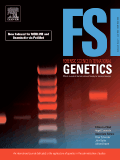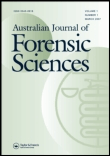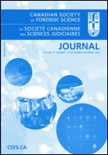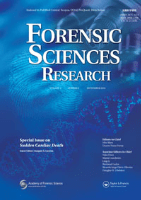
Forensic Science International-Genetics
Scope & Guideline
Pioneering the Intersection of Genetics and Forensic Analysis
Introduction
Aims and Scopes
- Forensic DNA Analysis:
The journal emphasizes the development and application of DNA analysis techniques, including STR (Short Tandem Repeat) and SNP (Single Nucleotide Polymorphism) profiling, to enhance individual identification and kinship analysis in forensic investigations. - Genomic Technologies in Forensics:
Research on next-generation sequencing (NGS) and other advanced genomic technologies is a core focus, aimed at improving the accuracy and efficiency of forensic genetic analyses. - Biogeographical Ancestry and Phenotyping:
The journal promotes studies linking genetic markers to biogeographical ancestry and phenotypic traits, facilitating the understanding of population structures and aiding in forensic investigations. - DNA Transfer and Persistence:
Investigations into the mechanisms of DNA transfer and persistence on various surfaces are crucial, providing insights into contamination and evidence collection in forensic contexts. - Ethical and Legal Considerations:
The publication addresses ethical issues and legal implications related to forensic genetics, ensuring that advancements in the field are aligned with societal norms and legal frameworks.
Trending and Emerging
- Machine Learning and Artificial Intelligence:
The incorporation of machine learning and AI techniques in forensic DNA analysis is on the rise, showcasing the potential for improving the interpretation of complex DNA mixtures and enhancing accuracy in forensic investigations. - Epigenetics in Forensics:
There is a growing interest in the application of epigenetic markers for age estimation and body fluid identification, reflecting a trend towards exploring biological indicators beyond traditional DNA analysis. - Environmental DNA (eDNA) Analysis:
The use of environmental DNA for forensic purposes is gaining momentum, offering innovative methods for species identification and understanding human interactions with environments. - Microhaplotypes and Advanced Markers:
Research focusing on microhaplotypes and other advanced genetic markers is trending, as these tools provide enhanced discriminatory power in kinship and mixture analyses. - Forensic Applications of Microbiomes:
Emerging studies on the role of microbiomes in forensic contexts, particularly in relation to human identification and time since deposition, indicate a novel intersection of forensic science and microbiology.
Declining or Waning
- Traditional Forensic Techniques:
There is a noticeable decline in papers focusing solely on traditional forensic techniques, such as basic serological methods, as the field increasingly shifts towards more advanced molecular techniques. - Single Source DNA Profiling:
Research specifically centered on single-source DNA profiling is becoming less frequent, possibly due to the growing emphasis on complex mixture analysis and the challenges presented in such cases. - Basic Population Genetics Studies:
The focus on basic population genetics studies, which were once prevalent, appears to be waning as the field moves towards more applied genetics, such as forensic applications of SNPs and microhaplotypes.
Similar Journals

Scandinavian Journal of Forensic Science
Transforming forensic insights into societal impact.The Scandinavian Journal of Forensic Science is a premier open-access journal published by SCIENDO since 2012, dedicated to advancing the field of forensic science. With its ISSN 2353-0707, this journal provides a platform for researchers, professionals, and students to disseminate their findings on various aspects of forensic investigations, including but not limited to forensic biology, chemistry, toxicology, and crime scene analysis. The journal plays a vital role in promoting collaboration and knowledge exchange among forensic practitioners and academics, ensuring that cutting-edge research is accessible to all. As a part of the reputable SCIENDO publishing group, the Scandinavian Journal of Forensic Science upholds high standards of peer review and editorial rigor, making it an essential resource for those involved in the forensic science community. Readers can benefit from its open-access model, which fosters wide dissemination and enhances the visibility of published works, ultimately contributing to the societal impact of forensic research.

JOURNAL OF FORENSIC PSYCHIATRY & PSYCHOLOGY
Exploring the Nexus of Psychology and LawJOURNAL OF FORENSIC PSYCHIATRY & PSYCHOLOGY, published by Routledge Journals, Taylor & Francis Ltd, is a pivotal platform for advancing knowledge at the intersection of psychology, psychiatry, and the legal system. With an ISSN of 1478-9949, this esteemed journal has been providing a critical forum since its inception in 2003, continuing through to 2024, to foster interdisciplinary dialogue among researchers, clinicians, and legal professionals. The journal holds a Q3 category ranking in both Clinical Psychology and Psychiatry and Mental Health, reflecting its important contributions to the field. With a focus on empirical research, theoretical perspectives, and case studies, it aims to enhance the understanding of forensic issues while ensuring ethical considerations in psychological assessments and interventions. Although it currently does not provide open access, the journal's rigorous peer-review process assures high-quality publications. Researchers looking to stay at the forefront of forensic psychology will find this publication indispensable for their scholarly work and practical applications.

Conservation Genetics Resources
Innovating Conservation Strategies with Genetic KnowledgeConservation Genetics Resources, published by SPRINGER in Germany, is a key resource in the field of conservation science, focusing on the genetic aspects essential for biodiversity preservation and ecosystem management. With an ISSN of 1877-7252 and an E-ISSN of 1877-7260, this journal has established its presence as a vital platform for disseminating high-quality research that addresses the challenges of genetic conservation strategies. Notably, it has demonstrated a strong academic impact, currently holding a Q3 ranking in Ecology, Evolution, Behavior and Systematics and Q4 in Genetics for 2023, alongside Scopus ranks that position it as a notable contributor in its fields. This journal invites contributions that enhance the understanding of genetic diversity, population genetics, and conservation genomics, and it serves as an essential reference for researchers, professionals, and students committed to the preservation of our natural heritage. The access options are varied, catering to the needs of its diverse readership, and making it an indispensable addition to academic research spaces.

Anil Aggrawals Internet Journal of Forensic Medicine and Toxicology
Enhancing Visibility for Critical Forensic ContributionsAnil Aggrawals Internet Journal of Forensic Medicine and Toxicology, an esteemed publication in the field of forensic medicine and toxicology, is dedicated to disseminating innovative research and critical insights since 2000. Published by ANIL AGGRAWALS INTERNET JOURNAL FORENSIC MEDICINE & TOXICOLOGY, the journal caters to professionals, researchers, and students keen on advancing their understanding of forensic science, including its intersections with law and public health. Although it currently holds a Q4 quartile ranking in Law, Pathology and Forensic Medicine, and Toxicology, the journal provides a vital platform for underrepresented studies, encouraging a diverse range of scholarly contributions. With its open access model, the journal enhances visibility and accessibility, ensuring that valuable research can reach a wider audience. As the journal continues to evolve, it plays a crucial role in bridging theoretical knowledge and practical applications, thereby enriching the discourse within its fields of study and fostering inter-disciplinary collaborations.

Australian Journal of Forensic Sciences
Elevating Forensic Practices with Cutting-Edge DiscoveriesThe Australian Journal of Forensic Sciences, published by Taylor & Francis Ltd, stands as a pivotal resource in the field of forensic medicine and pathology. With an ISSN of 0045-0618 and an E-ISSN of 1834-562X, this esteemed journal has been at the forefront of forensic research since its inception in 1968. Currently classified in the Q2 category for the year 2023 within its domain, it ranks 92nd out of 208 journals, placing it within the 55th percentile in Scopus rankings. The journal's scope encompasses a diverse range of topics critical to the advancement of forensic sciences, making it an essential platform for researchers, professionals, and students seeking to stay abreast of the latest developments and methodologies in the field. Although not an open-access publication, the journal serves as a crucial conduit for disseminating high-quality research, contributing significantly to the ongoing evolution of forensic practice and knowledge.

Canadian Society of Forensic Science Journal
Exploring the Intersection of Science and JusticeThe Canadian Society of Forensic Science Journal, published by Routledge Journals, Taylor & Francis Ltd, serves as a vital platform for the dissemination of research in the field of forensic science, particularly focusing on pathology and forensic medicine. With a rich history since 1968 and an impressive commitment to academic rigor, this journal has established itself as an essential resource for researchers, practitioners, and students alike. Recognized within the Q3 category in the 2023 Scimago Journal Rank in Pathology and Forensic Medicine, it ranks #162 out of 208 journals in its category, affirming its relevance and contribution to the field. While it does not operate under an open access model, the journal remains accessible through institutions and libraries and provides critical insights into advancements and best practices in forensic science. Through its comprehensive approach, the journal aims to advance forensic knowledge and contribute to the professional development of those engaged in this pivotal area of study.

Forensic Sciences Research
Empowering Forensic Innovation Through Open AccessForensic Sciences Research is a distinguished open-access journal published by Oxford University Press, dedicated to the interdisciplinary field of forensic sciences. Since its inception in 2016, the journal has rapidly established itself as a vital resource for researchers, professionals, and students in areas including analytical chemistry, anthropology, biochemistry, genetic studies, and various branches of forensic medicine. With an impressive range of impact factor metrics across multiple categories—including Q1 rankings in Anthropology for 2023—this journal provides unparalleled access to high-quality research while facilitating the dissemination of innovative ideas and methodologies in forensic science. Researchers benefit from the journal's extensive Scopus ranking, which showcases its influential position within the academic community. The open-access model allows global accessibility, ensuring that vital forensic research reaches a diverse audience and contributes to advancements in public safety and legal processes. For those engaged in the practical realities of forensic investigation or the theoretical underpinnings of the field, Forensic Sciences Research is an indispensable journal that continues to advance knowledge and foster collaboration within the forensic community.

Egyptian Journal of Forensic Sciences
Empowering forensic research for global impact.The Egyptian Journal of Forensic Sciences, published by the International Association of Law & Forensic Sciences, stands as a premier platform for scholarly communication in the fields of forensic science, law, and health-related social sciences. With an ISSN of 2090-536X and an E-ISSN of 2090-5939, this open-access journal, established in 2011, has garnered a reputation for its rigorous peer-review process and substantive contributions to the field. Housed in Switzerland, it boasts impressive metrics, achieving a Q2 ranking in Health (social science) and a stellar Q1 in Law, in addition to being recognized in Pathology and Forensic Medicine. With its articles accessible to a global audience, the journal encourages the exchange of innovative ideas and practices among researchers, professionals, and students who are dedicated to advancing the disciplines of forensic science and legal studies. As of 2023, it ranks in the 75th percentile in Social Sciences - Law and continues to influence both academic discourse and practical applications in the forensic domain.

Forensic Science Medicine and Pathology
Pioneering Research at the Intersection of Science and JusticeForensic Science Medicine and Pathology is an esteemed journal published by HUMANA PRESS INC, focusing on the critical intersections of forensic science, medicine, and pathology. Since its inception in 2005, this journal has provided a vital platform for researchers and practitioners to share innovative studies and findings that enhance our understanding of forensic methodologies and their applications in medical contexts. With an impact factor reflecting its significant contribution to the field, it holds a Q3 ranking in Medicine (miscellaneous) and a commendable Q2 ranking in Pathology and Forensic Medicine as of 2023, indicating its growing influence among scholarly circles. The journal is indexed in Scopus, ranking #76 out of 208 in the Medicine – Pathology and Forensic Medicine category, placing it in the 63rd percentile. Despite it not being an Open Access journal, it remains a crucial resource for professionals, students, and researchers dedicated to forensic sciences and related disciplines. For those seeking cutting-edge research and advancements in forensic methodologies, this journal is an essential addition to any academic repertoire.

Mitochondrial DNA Part B-Resources
Connecting Researchers Through Mitochondrial InsightsMitochondrial DNA Part B-Resources, published by TAYLOR & FRANCIS LTD, is a prominent academic journal focusing on the vast and evolving field of genetics and molecular biology. As an open access resource, it is dedicated to providing valuable insights and comprehensive data on mitochondrial DNA, an area crucial for understanding cellular functions, genetic inheritance, and various diseases. Although relatively new, having commenced in 2016, the journal has gained recognition with its current Scopus rankings placing it in the lower quartiles for both Genetics and Molecular Biology. It serves as an essential platform for researchers, professionals, and students at the intersection of genetics and biotechnology, fostering collaboration and innovation. With a commitment to quality research and accessibility, Mitochondrial DNA Part B-Resources is poised to contribute significantly to the scientific community until at least 2024 and beyond.